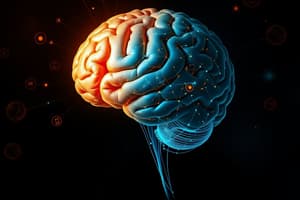Podcast
Questions and Answers
What are the three activities that Mead states help develop the self?
What are the three activities that Mead states help develop the self?
- Communication, Interaction, Recognition
- Mimicry, Performance, Education
- Language, Play, Games (correct)
- Imitation, Competition, Socialization
Which aspect of the self does 'the me' represent according to Mead's theory?
Which aspect of the self does 'the me' represent according to Mead's theory?
- The unstructured personality of the individual
- The innate emotional responses of the individual
- The socialized aspect formed by societal expectations (correct)
- The impulsive and unsocialized part of the self
What role does family play in the socialization process?
What role does family play in the socialization process?
- They serve mainly as a source of marketing influenced by media.
- They are the primary agent to reproduce society biologically and socially. (correct)
- They primarily focus on academic education and performance.
- They function as a competitive environment for skills development.
What is the Looking Glass Self process based on?
What is the Looking Glass Self process based on?
How does the Collective Self differ from the Public Self?
How does the Collective Self differ from the Public Self?
What does social comparison involve in terms of identity formation?
What does social comparison involve in terms of identity formation?
Which statement best describes social identification?
Which statement best describes social identification?
In what way does mass media function as an agent of socialization?
In what way does mass media function as an agent of socialization?
Flashcards
Self as a Cognitive Construct
Self as a Cognitive Construct
The self is a complex mental concept that influences our thoughts, emotions, and actions. It is shaped by our perceptions, beliefs, and past experiences.
Theory of the Social Self
Theory of the Social Self
Learning to understand situations by taking on the perspective of others, as if you were in their shoes.
Development of the Self
Development of the Self
The three activities that help us develop a sense of self: Language, Play, and Games. Language allows us to communicate through symbols and gestures. Play lets us pretend and take on different roles. Games teach us to follow rules and cooperate.
The 'Me'
The 'Me'
Signup and view all the flashcards
The 'I'
The 'I'
Signup and view all the flashcards
Looking Glass Self
Looking Glass Self
Signup and view all the flashcards
Public Self
Public Self
Signup and view all the flashcards
Collective Self
Collective Self
Signup and view all the flashcards
Study Notes
Self as a Cognitive Construct
- The self is a complex cognitive structure influencing thoughts, emotions, and behaviors.
- Shaped by perceptions, beliefs, and past experiences, it's key to identity and decision-making.
Theory of the Social Self
- Individuals develop self by interpreting situations through "taking the role of the other".
- This learning happens through:
- Imitation (gestures, words)
- Play (specific roles)
- The generalized other (group roles)
Development of the Self (Mead's Theory)
- Three activities develop the self:
- Language: responding through symbols, gestures, and sounds.
- Play: taking different roles to understand others' expectations.
- Games: understanding and adhering to rules.
Two Sides of the Self: Me and I
- Mead's theory proposes two aspects of the self:
- The "Me": a socialized aspect, representing learned behaviors, attitudes, and societal expectations.
- The "I": the active, spontaneous part of the self.
Agents of Socialization
- Family: Crucial for both biological and social reproduction, influencing socialization.
- Mass Media: Socializes children and adults in various ways.
- Peer Groups: Influence is significant, often peaking during adolescence.
- Religion: Children often adopt the religious beliefs of their parents.
- School: Teachers and students create expectations shaping children's behavior.
The Looking-Glass Self
- Individuals form their self-image based on perceived reactions of others.
The Public Self
- Others' assessments of a person's identity.
The Collective Self
- The self tied to group memberships (family, coworker, professional groups).
Social Categorization, Identification, and Comparison
- Social categorization: Grouping people by social environment.
- Social identification: Adopting group identity.
- Social comparison: Comparing yourself to the in-group.
Studying That Suits You
Use AI to generate personalized quizzes and flashcards to suit your learning preferences.




